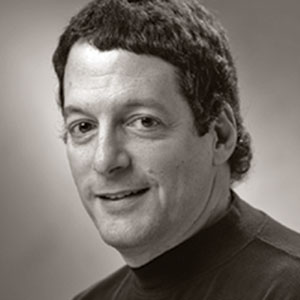
I first met Lou Blum (A'34) in the mid-80s. At that time, my wife, Deb, and I lived in an apartment, not too far from the Carnegie Mellon campus, with Brandy, our English springer spaniel. During our evening walks with Brandy, we would pass a beautiful old home that was in the midst of being divided into three condos. Unfortunately for us, the asking price was well beyond what we could afford, so the thought of living there was nothing more than a dream. But, on one of those evening walks, we noticed that the asking price for each of the condos had been greatly reduced. Our dream of a mortgage payment became a reality.
Deb and I, eager to live in our own home, moved in before completion of several rooms. The unfinished kitchen gave Deb's widowed grandmother, Shirl Wagman, the chance to give us a generous gift: a two-door deluxe refrigerator/freezer. Deb, ever the perfectionist, had the counters and cabinets designed in our galley kitchen so there would be a space for the massive appliance to slide right in. By the time it was delivered, all of the work had been done. The refrigerator/freezer was the final piece in making our home complete. There was a problem, though. It didn't fit, something about 100-year-old warped walls making the space a bit smaller than what was devised in the plans.
No big deal; we would have the countertop shaved and exchange some cabinets to create an adequate space. Seemed like a simple solution until we learned that the cabinets came from a company that had gone out of business and the countertop might shatter completely if cut. So, the refrigerator/freezer remained parked in the middle of our galley kitchen, leaving just enough room for Brandy to squeeze by, and not much else. When Shirl and her 70-something widower boyfriend came to visit, they were greeted by two traumatized homeowners.
Lou hadn't been a man of many words during the few times we'd previously met. But that didn't stop him from offering his opinion about our kitchen fiasco. He said simply, "Don't worry; there's nothing that can't be fixed." His comment had an immediate calming effect on Deb and me. Not only did it provide comfort, it proved to be prophetic. Cabinets were found, the countertop was cut without shattering, Shirl's present slid into place, and Lou gave Deb and me a different take on how to cope with adversity.
Five years ago, Lou passed away peacefully at the age of 94, but his words of wisdom have remained with me to this day. Instead of fearing the worst, he always remained optimistic that the most insurmountable problems had answers. It's an outlook that came to me time and again as I edited this issue—from the perilous state of the economy to the unattainable cost of higher education for so many deserving students to the proliferation of toxic chemicals in our environment. All three of those feature stories could have shared the same headline:
There's Nothing That Can't Be Fixed.
—Robert Mendelson
Executive Editor



